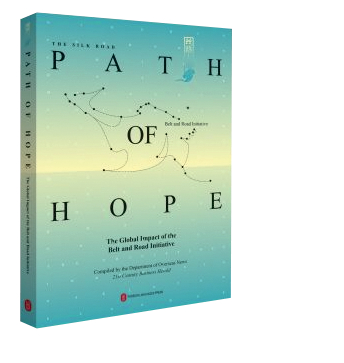

Path of Hope: The Global Impact of the Belt and Road Initiative
Compiled by the 21st Century Business Herald’s Department of Overseas News
Paperback, 308 pages
Price: RMB 88
Published by Foreign Languages Press
Path of Hope: The Global Impact of the Belt and Road Initiative is written by senior international journalists at the Department of Overseas News of the 21st Century Business Herald, a leading business newspaper in China. The book consists of 18 chapters which focus on the Belt and Road (BRI) flagship projects launched by Chinese enterprises in BRI participanting countries.
By introducing these projects in Asia, Europe, Africa, and Latin America, the book, through dialogues with scholars at home and abroad, explores the socio-economic impact of China-funded projects on the host countries. What’s more, it also analyzes the political, economic, and trade relations between China and the host countries where these projects are located, making the whole book more informative, readable, and digestible.
Here are some impressive examples in the book. The chapter on Hungary tells the story of Chinese tech company Lenovo, which built a new facility in Hungary to be a flagship hi-tech manufacturer. It narrates how Lenovo overcame the difficulties caused by the COVID-19 pandemic and put its manufacturing base into production in just two years. The book also presents the reasons for Lenovo’s location in Hungary, taking into consideration of the company’s industrial layout and supply chain in Europe. Lenovo’s overseas expansion and its visionary settlement in Hungary has showcased the Chinese enterprise’s international vision in the era of globalization. The story also indicates that the BRI has proven that globalization promotes development, and that major Chinese projects have enabled Hungary to become an important participant in the BRI cooperation.
Then the book moves on to Qatar, focusing on such examples as the construction of Lusail Stadium, a newly built stadium which served as the venue of the 2022 World Cup in the country. The golden bowl-shaped venue equipped with 80,000 seats was jointly built by a consortium of China Railway Construction Corp Ltd. and Qatar’s premier HBK Contracting Company W.L.L. To complete this iconic building and make it a “Made in China” flagship project, many Chinese enterprises were involved, including Sany Heavy Industry, Zoomlion Heavy Industry, and Jinggong Steel, providing a new vision for China-Qatar cooperation as regard to China’s smart green building technologies.
In addition to these fruitful achievements on flagship projects, the book also highlights the innovative cooperation model of building the BRI, which emphasizes policy communication, road connectivity, unimpeded trade, financial integration, and people-to-people exchanges. The overseas BRI projects described in the book have promoted communication between Chinese and foreign people by improving the livelihoods of local people.
Phinij Jarusombat, former deputy prime minister of Thailand and president of Thai-Chinese Cultural Relationship Council, stated in an interview in the book that the arrival of Chinese enterprises brings his country new opportunities for bilateral cooperation. For example, Chinese electrical appliance manufacturers have brought new production technologies to Thailand; and some Chinese medical companies have also invested in Thailand. Meanwhile, the experience of China’s e-commerce poverty alleviation methods can be applied to Thailand, enabling local farmers to access e-commerce platforms, understand market pricing rules, and connect with customers throughout the country and beyond, saving transaction processes and time, while boosting the economy.
Far away in Greece, Piraeus Port of Athens is a key gateway for economic and trade exchanges between China and Europe, which is also known as a vital node on the 21st-Century Maritime Silk Road. With the port’s operation by China COSCO Shipping Group, it has grown from annual losses of over €10 million to being one of the largest container ports in the eastern Mediterranean region in just a few years. In the six years since COSCO Shipping took over the Piraeus Port, the company has paid €125 million in taxes to the Greek government, and created more than 4,000 local jobs. COSCO Shipping Group has not only enhanced the performance of port operations, but also attaches great importance to fulfilling social responsibilities. The great deeds by Chinese companies and their foreign partners has been witnessed and applauded by the local government and people, who thus welcome Chinese enterprises to increase investment.
These cases have effectively countered the prejudice of some groups in the West towards the BRI, proving that it is neither a strategy of carrot and stick, nor an underhanded debt trap, but rather a platform for common development. As the Minister of Finance of Hungary Mihály Varga said at the first Belt and Road Forum for International Cooperation, the development of one region can benefit another remote region. As long as there is a smooth connection between the two regions, synergy is possible.
In terms of the overall writing style, this book has the liveliness and readability of international news reports. They read like a field reports on the BRI and bilateral or multilateral economic and trade relations. Meanwhile, it also has the value of academic research, deepening the public understanding of the BRI. It is necessary for more foreign readers to understand the true story of the BRI and see how this visionary initiative can bring huge changes and great hope to the world. It is also an attempt to break the narrative framework of mainstream Western media, and allow the world to understand the real China and its solutions toward global development.
Since the BRI was put forward, it has brought unprecedented changes to the world. By building infrastructure and seeking to nurture a new international order of equality, it has promoted multilateral cooperation, injecting new vitality into the world economy. Meanwhile, the initiative has also made important contributions to improving people’s well-being, and maintaining peace and stability.